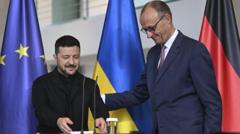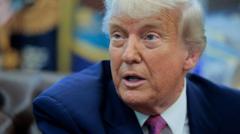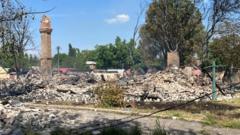During a recent meeting with Ukraine's President Volodymyr Zelensky, German Chancellor Friedrich Merz announced plans to help Ukraine produce long-range missiles. The collaboration aims to boost Kyiv's defense capabilities amid ongoing tensions in the region. While Merz's commitments signal a significant policy shift in German support for Ukraine, the Kremlin has expressed concerns about the potential escalation of conflict.
Germany's Merz Commits to Support Ukraine's Long-Range Missile Production

Germany's Merz Commits to Support Ukraine's Long-Range Missile Production
Friedrich Merz, Germany's new chancellor, pledges assistance to Ukraine in producing long-range missiles to enhance its defense against Russian aggression, despite Kremlin warnings.
Germany's new chancellor, Friedrich Merz, has made a strong commitment to support Ukraine by assisting in the production of long-range missiles. This promise was conveyed during a meeting with Ukraine's President Volodymyr Zelensky in Berlin, highlighting Germany's renewed focus on bolstering its backing of Kyiv amid the ongoing conflict with Russia. Merz stated, "We want to talk about production and we will not publicly discuss details," when asked about the specifics of weapon supplies, including the potential provision of Taurus missiles.
Merz, who assumed office earlier this month, indicated that there would no longer be any restrictions on the range of weaponry supplied to Ukraine by Western allies. The Taurus missile boasts a range of 500 kilometers (310 miles) and could potentially reach targets deep within Russia. While the chancellor did not explicitly name the Taurus during his remarks, an upcoming "memorandum of understanding" regarding long-range missile collaboration is expected to be signed by the defense ministers of Germany and Ukraine.
The Kremlin has responded with caution, warning that any move to lift range restrictions on Ukraine's missile capabilities would represent a dangerous shift in policy, potentially complicating efforts to negotiate a peaceful resolution. Nonetheless, Merz emphasized that this decision was part of a broader strategy among Western allies that had been in the works for several months.
In a twist of diplomatic dynamics, Zelensky suggested that any future peace talks should involve key global leaders, stating interest in a dialogue format featuring "Trump-Putin-me." While Kremlin spokesperson Dmitry Peskov did not flatly reject this proposal, he specified that such discussions would require the completion of concrete agreements between delegations.
Following the recent resumption of direct talks between Ukraine and Russia, which concluded with a minor agreement on a prisoner exchange, there remains skepticism about substantial progress. Russian Foreign Minister Sergei Lavrov recently hinted at a forthcoming announcement regarding additional negotiations but maintained that Moscow seeks to ensure a neutral status for Ukraine moving forward.
As diplomatic efforts continue at a slow pace, military engagements in Ukraine remain intense. Reports indicate a significant increase in drone strikes, while Ukrainian defenses are experiencing intensified assaults from Russian forces in the northeast region. Zelensky noted a massive buildup of Russian troops along the Sumy front, exacerbating the ongoing military confrontation.
With the war now extending into its fourth year, both sides have sustained heavy casualties and substantial territorial losses. The complexities of reaching a diplomatic resolution linger amid ongoing military operations, with Zelensky accusing Moscow of deliberately stalling the peace process. Peskov has, however, asserted that discussions regarding a peace memorandum are in the final stages.
As the situation continues to evolve, the implications of Germany's support for Ukraine's military capacities are set to influence the broader geopolitical landscape in the region, underlining the intricate balance of power and diplomacy in the protracted conflict.




















